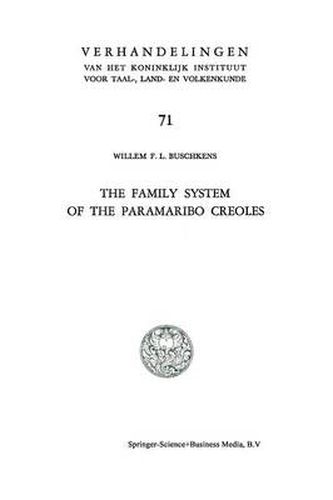Readings Newsletter
Become a Readings Member to make your shopping experience even easier.
Sign in or sign up for free!
You’re not far away from qualifying for FREE standard shipping within Australia
You’ve qualified for FREE standard shipping within Australia
The cart is loading…






This title is printed to order. This book may have been self-published. If so, we cannot guarantee the quality of the content. In the main most books will have gone through the editing process however some may not. We therefore suggest that you be aware of this before ordering this book. If in doubt check either the author or publisher’s details as we are unable to accept any returns unless they are faulty. Please contact us if you have any questions.
1.1. General In this book the family life of the lower-class Creole population of 1 Paramaribo will be discussed. This group, which will henceforward be referred to as the lower-class Creoles , possesses a West Indian family system, implying that the latter display all the main characteristics of the Caribbean Afro-American family. The Creoles constitute a numerically important ethnic segment of the society of Surinam. This society is composed of different ethnic groups, comprising, besides a handful of Amerindians, an immigrant population including people from many different parts of the world. It is made up of Creoles, Indians (or Hindustanis, as they are called in Surinam), Indonesians (Javanese), Chinese, Europeans, Lebanese and Bush Negroes, the latter of whom still live predominantly in tribes. The Creoles are the descendants of those Negro slaves brought to Surinam from Africa who did not escape from bondage by running away from the plantations into the Bush, as their brothers the Bush Negroes did. The circumstances under which the bulk of the slaves lived were appalling. Nor were they - or are they still in p~ at present - much better for their descendants the lower-class Creoles.
$9.00 standard shipping within Australia
FREE standard shipping within Australia for orders over $100.00
Express & International shipping calculated at checkout
This title is printed to order. This book may have been self-published. If so, we cannot guarantee the quality of the content. In the main most books will have gone through the editing process however some may not. We therefore suggest that you be aware of this before ordering this book. If in doubt check either the author or publisher’s details as we are unable to accept any returns unless they are faulty. Please contact us if you have any questions.
1.1. General In this book the family life of the lower-class Creole population of 1 Paramaribo will be discussed. This group, which will henceforward be referred to as the lower-class Creoles , possesses a West Indian family system, implying that the latter display all the main characteristics of the Caribbean Afro-American family. The Creoles constitute a numerically important ethnic segment of the society of Surinam. This society is composed of different ethnic groups, comprising, besides a handful of Amerindians, an immigrant population including people from many different parts of the world. It is made up of Creoles, Indians (or Hindustanis, as they are called in Surinam), Indonesians (Javanese), Chinese, Europeans, Lebanese and Bush Negroes, the latter of whom still live predominantly in tribes. The Creoles are the descendants of those Negro slaves brought to Surinam from Africa who did not escape from bondage by running away from the plantations into the Bush, as their brothers the Bush Negroes did. The circumstances under which the bulk of the slaves lived were appalling. Nor were they - or are they still in p~ at present - much better for their descendants the lower-class Creoles.